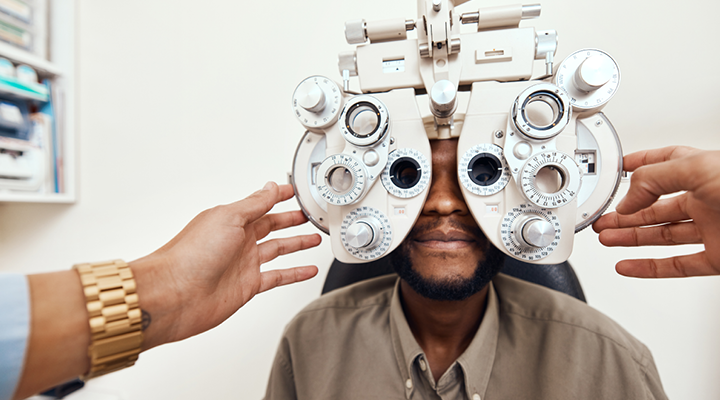Many of us underestimate the importance of regular eye exams, viewing them as just another checkbox on our health maintenance list. However, eye exams are much more than a routine procedure; they’re a critical tool in protecting our overall health. These exams can detect early signs of serious health issues, ranging from vision-related problems like glaucoma and macular degeneration to systemic conditions such as diabetes and high blood pressure.
Learn about the protective power of eye exams and how they not only safeguard your vision but also serve as a window to your body’s overall health.
Eye exams protect your vision
Eye exams are essential not just for ensuring proper vision but also for detecting early signs of serious eye conditions that may not yet be showing symptoms.
Conditions like glaucoma, cataracts, diabetic retinopathy, and macular degeneration can begin to develop without noticeable changes in vision or comfort, making regular eye exams critical for early diagnosis. Regular eye exams enable health care professionals to manage or treat eye diseases effectively at an early stage, potentially saving sight and improving quality of life.
Eye exams help detect serious medical problems
Your eyes can be windows to your health. Serious health problems show early signs through your eyes—ones you don’t want to miss.
Many people are surprised to learn that an eye exam can detect more than 270 different medical conditions. A visit to your eye doctor can help identify signs of diabetes, high blood pressure, and high cholesterol, as well as eye diseases like cataracts and glaucoma. Uncovering these conditions early makes it easier to treat them sooner.
Eye exams can help alleviate digital eye strain
The Journal of Ophthalmology and Therapy defines digital eye strain (DES) as “an entity encompassing visual and ocular symptoms arising due to the prolonged use of digital electronic devices. It is characterized by dry eyes, itching, foreign body sensation, watering, blurring of vision, and headache.”
Eye exams can help with diagnosing digital screen-related vision problems. Your eye doctor can work with you to find solutions for symptoms like headaches, blurred vision, and dry eyes. Common solutions include using blue light glasses and/or prescription glasses that have blue light protection, taking frequent breaks, and adjusting your work area to be more comfortable for your eyes.
Eye exams at every age
Eye exams are important at every age, whether you are 1 or 101. Everyone can experience vision problems, which may affect their quality of life.
Wondering how frequently you should be getting an eye exam? Here are recommendations based on age from the American Optometric Association (AOA):
- Birth through 2: Initial exam between 6 to 12 months of age
- Ages 3 through 5: At least once between 3 and 5 years of age
- Ages 6 through 17: Before first grade and annually thereafter
- Ages 18 through 64: At least every two years
- Age 65 and older: Annually
Always check with your eye care team and follow their recommendations for eye exam frequency.
Scheduling eye exams is easy with vision insurance
DeltaVision® coverage makes it easy to care for your eyes, find an eye doctor, and make an appointment. Our network has 109,000 access points, including the largest national network of independent doctors and 21,000 retail chain locations.
Learn more about our DeltaVision plans.
*Updated July 2024

